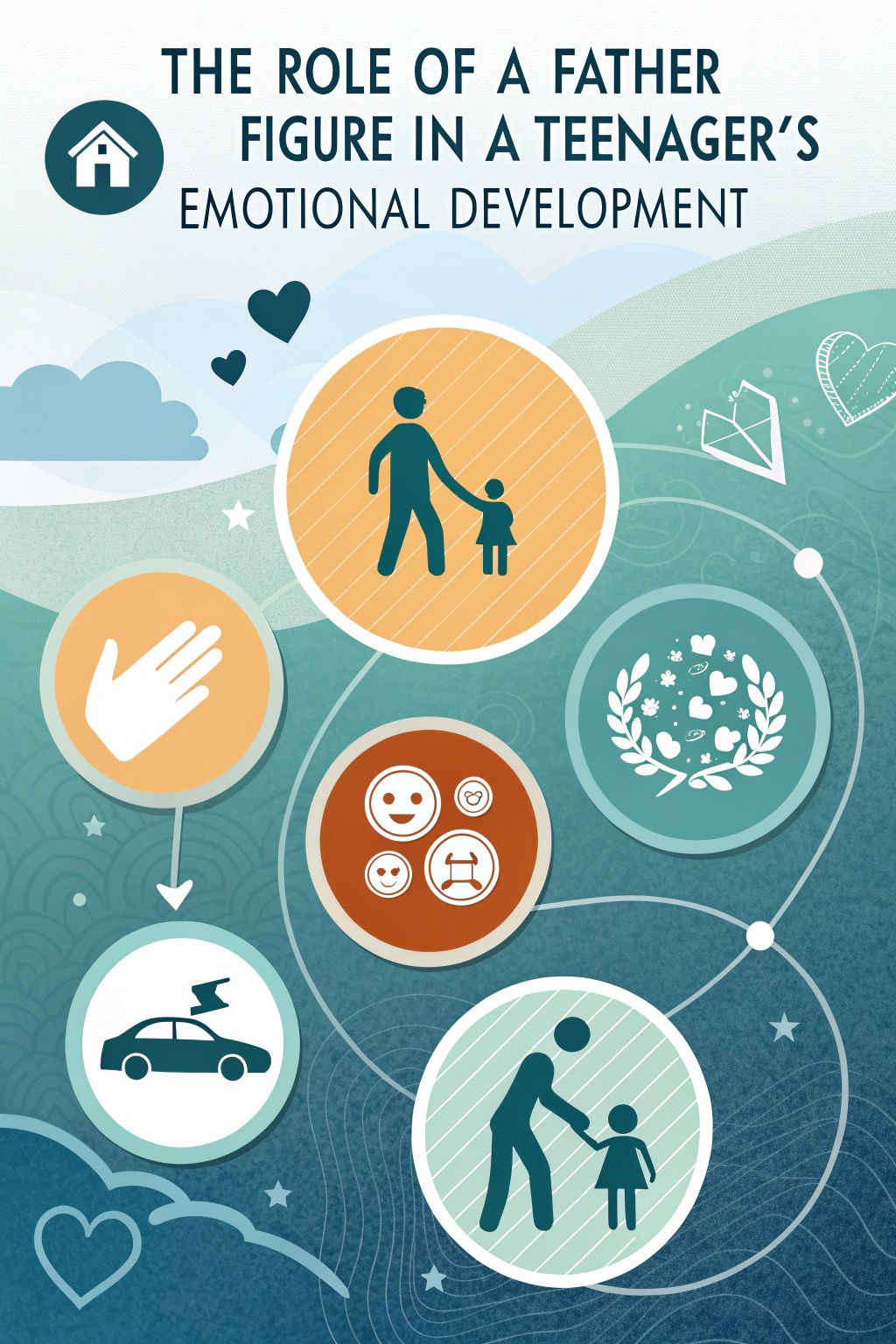The Role Of A Father Figure In A Teenager’s Emotional Development
Teenagers often struggle with emotional challenges as they grow. A father figure plays a key role in shaping their self-esteem and resilience. This article explores how fathers guide teens through emotional development and build stronger connections.
Keep reading to learn more.
Key Takeaways
- Fathers boost teens’ emotional resilience by teaching stress management and problem-solving skills.
- Active father involvement lowers the risk of depression and anxiety in teenagers.
- Father figures, including stepfathers and mentors, improve teens’ self-esteem and communication abilities.
- Teens without father figures often struggle with emotional regulation and forming healthy relationships.
- Engaging through active listening and life guidance strengthens the parent-child bond and fosters personal growth.

The Role of a Father in Teenage Emotional Growth
Fathers play a key role in helping teens build emotional strength. They boost confidence, encourage independence, and teach responsibility through their actions and words.
Cultivating Emotional Resilience
Father figures play a key role in helping teenagers build emotional resilience. They teach teens how to handle stress and bounce back from setbacks, which boosts their self-regulation skills.
By modeling calm responses to challenges, fathers show adolescents how to manage emotions like anger or frustration effectively.
Active listening and open dialogue create a safe space for teens to express themselves without fear of judgment. This support helps young people develop coping strategies for stressors, leading to stronger mental health.
Fathers also encourage healthy problem-solving techniques, fostering confidence in facing life’s ups and downs. Regular guidance during these formative years strengthens emotional intelligence, preparing teens for future hurdles with greater stability.

Boosting Self-Esteem and Confidence
A father figure plays a crucial role in building a teenager’s self-esteem and confidence. Through consistent praise and encouragement, fathers help teens feel valued and capable.
Positive reinforcement, like acknowledging achievements or efforts, strengthens their self-image and fosters a sense of pride. Fathers also model resilience, showing how to handle setbacks without losing self-worth.
Teens learn to approach challenges with courage when they see their father figure tackle difficulties with a calm, confident attitude.
Active involvement in a teen’s life, such as attending events or offering guidance, further boosts their confidence. Fathers who listen actively validate their feelings and thoughts, making them feel understood and respected.
This support helps teens develop a strong sense of identity and self-control, essential for handling the challenges of adolescence. Fathers also teach problem-solving skills, empowering teens to make decisions independently.
This combination of emotional support and practical guidance builds a foundation of self-esteem that benefits their mental health and academic achievement.
Fostering Independence and Responsibility
Fathers play a key role in teaching teens to handle life’s challenges. They encourage responsibility by assigning tasks, like managing allowances or completing chores. This helps teens learn accountability and build confidence in their abilities.
Fathers also guide decision-making, allowing teens to weigh options and face consequences independently.
Showing trust in a teen’s choices strengthens their sense of self-reliance. For example, fathers can support teens in planning school projects or part-time jobs. This hands-on approach fosters emotional health and leadership skills.
Teens who feel trusted are more likely to develop discipline and social-emotional learning, preparing them for adulthood

Father Figures as Emotional Guides
Father figures teach teens how to handle emotions by showing healthy ways to express them. They also help teens build strong social skills, like empathy and problem-solving, through daily interactions.
Exhibiting Healthy Relationship Dynamics
Father figures play a key role in showing teenagers how healthy relationships work. They model respect, trust, and open communication through their actions. Teens learn to express their feelings clearly and handle conflicts calmly by watching these behaviors.
A strong father figure also demonstrates empathy, helping teens understand others’ emotions better.
Healthy relationship dynamics teach teens valuable social skills for life. Fathers who show affection and support create a secure attachment with their children. This bond helps teens feel safe and confident in their interactions with peers.
It also reduces the risk of behavior problems and improves their ability to build lasting relationships later on.
Instilling Empathy and Emotional Awareness
Father figures play a crucial role in teaching empathy and emotional awareness to teenagers. They model compassion through everyday actions, showing how to understand and respond to others’ feelings.
By openly sharing their own emotions, they encourage teens to do the same, fostering healthy communication.
Active listening strengthens this process. Fathers who pay attention without judgment help teens feel valued and understood. This builds trust and opens the door for deeper emotional connections within the family unit, enhancing overall mental health and cognitive development in adolescents.
Teaching Problem-Solving Techniques
Father figures play a key role in teaching teens how to solve problems effectively. They model critical thinking by breaking down complex tasks into manageable steps. Teens learn to analyze situations, weigh options, and make informed decisions through this guidance.
Active listening helps fathers understand their teen’s challenges better. They offer practical solutions while encouraging independent thinking, which builds confidence and resilience.
This approach strengthens communication skills and prepares teens for real-life situations like dealing with peer influence or stress related to socioeconomic status. Problem-solving techniques also reduce impulsivity, fostering emotional stability during crucial childhood development stages.
By practicing these methods regularly, teens develop creativity and motivation to handle challenges on their own, enhancing upward social mobility over time.

The Positive Effects of Active Father Involvement
Active father involvement builds emotional stability in teens, reduces risks of depression and anxiety, and strengthens their ability to communicate effectively, making a profound difference in their lives—keep reading to learn more.
Enhancing Emotional Stability
Father figures play a key role in enhancing emotional stability for teenagers. By providing consistent support and guidance, they help teens manage stress and regulate emotions effectively.
A stable father-child relationship reduces cortisol reactivity, which is linked to chronic stress. This support fosters a sense of security, helping teens navigate challenges with confidence.
Active involvement from a father figure strengthens the HPA axis, which controls stress responses. Teens with engaged fathers show better emotional regulation and fewer mental health problems like anxiety.
Fathers who model calm behavior teach teens how to handle life’s ups and downs. This emotional stability lays a strong foundation for healthy relationships and personal growth.
Lowering the Risk of Depression and Anxiety
Active father involvement plays a key role in lowering the risk of depression and anxiety in teenagers. Studies show that teens with engaged fathers often display better emotional stability.
They are less likely to experience physiological stress or develop issues like substance use, including tobacco use. Fathers who model healthy coping mechanisms help their children manage stress effectively, reducing feelings of dysregulation.
Father figures also provide consistent support, which strengthens bonding and builds resilience. This support can lower levels of corticotropin-releasing hormone linked to stress responses.
Teens with involved fathers tend to have higher self-esteem and fewer behavioral problems, creating a buffer against mental health challenges like depression and anxiety. Open communication further enhances these benefits, fostering trust and emotional safety within the parent-child relationship.
Improving Communication Abilities
Fathers play a key role in helping teens improve communication abilities. Their consistent presence encourages open dialogue, which builds trust. Teens with active father figures often learn to express emotions clearly.
They also develop better listening skills through regular interaction.
Fathers can model effective communication by discussing daily events and solving problems together. This practice helps teens handle conflicts in a constructive manner. Such guidance boosts their ability to articulate thoughts and feelings, fostering stronger relationships and emotional stability.

Exploring Various Father Figures
Father figures shape teens’ emotional growth, whether they’re biological dads or community mentors. Each role brings unique support, teaching teens empathy, responsibility, and resilience.
Biological Fathers
Biological fathers play a vital role in their teenage children’s emotional development. They help build self-esteem and confidence by offering consistent support and encouragement.
Fathers often model healthy communication and problem-solving, which teens can apply in their own lives. Active involvement from biological fathers fosters emotional stability, reducing the risk of anxiety or depression.
They also teach responsibility and independence, preparing teens for adulthood. Through love and guidance, biological fathers strengthen the parent-child bond, creating a foundation for healthy relationships.
Their presence positively impacts child development, shaping emotional awareness and resilience in teenagers.
Stepfathers
Stepfathers play a key role in shaping a teenager’s emotional development. They often step into complex family dynamics, offering support and stability. Active involvement in a teenager’s life can help build trust and foster a sense of security.
Stepfathers who engage in open communication and active listening create a safe space for emotional expression. This helps teens develop empathy and emotional awareness, crucial for healthy relationships.
Stepfathers also model problem-solving techniques, teaching teens how to handle challenges effectively. Studies show that teens with involved stepfathers often experience lower levels of anxiety and depression.
Their presence can boost self-esteem and encourage independence. Stepfathers, like biological fathers, significantly impact early childhood development and emotional stability. Their efforts in parenting style and childcare contribute to a teenager’s overall well-being.
Adoptive Fathers
Adoptive fathers provide emotional support and stability for their children, often stepping into a crucial role in a teenager’s life. They help build self-esteem and confidence, offering guidance that shapes emotional awareness.
By creating a secure environment, adoptive fathers encourage independence and responsibility in their adopted child.
These fathers play a vital part in teaching problem-solving techniques and nurturing empathy. Their involvement can improve communication abilities and strengthen the parent-child bond.
Through active listening and support, adoptive fathers help teens navigate challenges and develop healthy relationships. Their positive impact often lowers the risk of depression and anxiety in adolescence.
Foster Fathers
Foster fathers play a crucial role in the emotional development of teenagers. They provide stability and care, helping teens build trust and security. These men often step into challenging situations, offering guidance when it’s most needed.
Active involvement from foster fathers can shape a teenager’s ability to manage emotions. They teach problem-solving skills, encourage curiosity, and model healthy relationships. Their support helps teens develop self-esteem and independence, even during tough times.
Without a father figure, teenagers may face emotional struggles or behavioral issues. Foster fathers fill this gap by offering consistent support and understanding. Their presence strengthens communication abilities and fosters empathy in young people.
Engaging with teens through open dialogue is key for foster fathers. Listening actively shows they care about the teen’s feelings and experiences. This connection deepens their bond and promotes personal growth for both parties involved.
Father figures like foster dads contribute to lowering risks of depression or anxiety among teenagers raised in low-SES environments where maltreatment might occur more frequently than usual circumstances would dictate otherwise but still remain statistically significant nonetheless due largely because these individuals are willing participants who want nothing better than see those under their watch succeed despite odds stacked against them at times which makes all difference world over again every single day without fail!
Community Mentors and Role Models
Community mentors and role models play a vital role in a teenager’s emotional growth. They offer guidance, support, and stability outside the family structure. Teachers, coaches, or local leaders often step into these roles, providing positive examples for teens to follow.
These figures help teens develop empathy, responsibility, and problem-solving skills, fostering emotional awareness and resilience.
Active involvement from mentors can lower the risk of behavioral issues and improve communication abilities. Teens with strong community role models often show higher self-esteem and better relationship dynamics.
Community figures also teach non-verbal cues, enhancing emotional stability and confidence. Their influence is especially impactful for teens without father figures, helping them navigate challenges and personal development.

Challenges Faced Without a Father Figure
Teens without a father figure often struggle with emotional regulation. They may face difficulties in forming healthy relationships later in life.
Emotional and Behavioral Issues
Teenagers without a father figure often face emotional and behavioral challenges. They may struggle with low self-esteem, impulsivity, and difficulty managing emotions. Studies show that child psychotherapists frequently note these issues in teens lacking paternal support.
Emotional instability can lead to problems in school, relationships, and decision-making. Teens may also exhibit signs of anxiety or depression, which can affect their overall mental health.
Fathers play a key role in providing structure and guidance, helping teens develop healthier coping mechanisms. A strong father figure can reduce the risk of behavioral problems and promote better emotional regulation.
Problems in Developing Healthy Relationships
Teens without a father figure often face difficulties in forming healthy relationships. They may struggle to trust others, leading to communication issues. Emotional awareness, crucial for empathy, can be underdeveloped without guidance.
These teens might also misinterpret conflict, viewing it as rejection or failure. Fathers, or father figures, play a key role in teaching healthy interaction patterns. Their absence can hinder a teen’s ability to build strong, lasting connections.
Emotional stability, often nurtured through fatherly support, becomes harder to achieve. This lack of stability can affect friendships, romantic relationships, and even professional interactions later in life.

Support Strategies for Fathers
Fathers can build stronger bonds with their teens by practicing active listening and open dialogue. Offering steady guidance and supporting emotional growth helps teens develop confidence and resilience.
Engaging Through Active Listening and Dialogue
Active listening and open dialogue strengthen the bond between fathers and teenagers. Fathers can create a safe environment by giving their undivided attention, maintaining eye contact, and responding thoughtfully.
This practice helps teens feel valued and understood, boosting their confidence. Dr. Adekemi “Dr. O” Oguntala highlights the significance of these skills in building trust.
Using techniques like reflective statements or summarizing what’s said demonstrates genuine interest. Fathers should avoid interrupting or offering quick solutions during conversations.
Instead, they can ask open-ended questions to encourage deeper sharing. This method builds emotional awareness and improves communication abilities for both parties.
Single dads often find active listening essential for handling parenting challenges effectively. Engaged fathers help teens process emotions better, reducing risks of depression or anxiety over time through consistent support rather than strict discipline alone without connection first being established firmly beforehand.
Offering Life Guidance
Fathers play a crucial role in offering life guidance to their teenagers. They help shape decision-making skills by setting clear expectations and boundaries, which builds confidence and responsibility.
Engaging in open dialogue fosters trust, making it easier for teens to seek advice on challenges like relationships or school pressures.
Life guidance from fathers also includes teaching practical skills such as budgeting, time management, and problem-solving techniques. These tools prepare teenagers for adulthood while reducing impulsivity.
Fathers who actively listen and provide support enhance emotional stability, lowering the risk of issues like depression or anxiety later in life. This involvement strengthens the parent-child relationship and encourages personal growth for both parties.
Supporting Personal and Emotional Development
Fathers play a vital role in helping teenagers grow emotionally. They offer guidance by showing how to manage feelings and handle stress. Teens often look to their dads for advice on life’s challenges, which builds their emotional awareness.
Fathers can encourage personal growth by praising efforts and celebrating small wins.
Active listening and open talks create a safe space for teens to share their thoughts. This strengthens the parent-child relationship and boosts the teen’s confidence. Fathers who engage in activities like sports or hobbies with their teens teach teamwork and patience.
These shared moments foster emotional stability and resilience, helping teens navigate tough situations.

The Rewards of Fatherly Engagement
Fatherly engagement strengthens bonds, creating deeper connections between parent and child. Active involvement also brings personal growth, offering fathers emotional fulfillment through shared experiences.
Deepening the Parent-Child Relationship
Active father involvement builds stronger bonds with teens. Fathers who listen openly and share their own experiences create trust. Teens feel more secure, knowing they have a reliable emotional guide.
This connection helps fathers understand their child’s needs better.
Spending quality time together strengthens these ties. Activities like sports, hobbies, or even simple conversations make a difference. Fathers who encourage independence while offering support foster mutual respect.
This balance helps teens grow confident and emotionally stable.
Father figures, whether biological or mentors, shape a teen’s emotional development. Their consistent presence and guidance leave a lasting impact. This relationship boosts self-esteem and improves communication skills.
Teens with involved fathers often handle stress and challenges more effectively.
Supporting a teen’s personal growth deepens the parent-child bond. Fathers who actively engage in their child’s life build a foundation of trust and love. This connection benefits both the teen and the father, creating a lasting emotional legacy.
Gaining Personal Satisfaction and Emotional Growth
Fathers who engage meaningfully with their teenagers often experience personal satisfaction and emotional growth themselves. Active involvement in a teen’s life strengthens the bond, creating a sense of fulfillment.
Fathers learn to understand their own emotions better as they guide their children through challenges. This process enhances empathy, patience, and communication skills. Fathers also gain insight into their own emotional development, reflecting on their actions and choices.
The shared experiences, from daily conversations to solving problems, build lasting memories. These moments contribute to a deeper connection and mutual growth. Fathers find purpose in shaping their teen’s future, fostering both the child’s and their own emotional well-being.
This engagement enriches the parent-child relationship, creating a positive cycle of support and understanding.
Conclusion
A father figure shapes a teen’s emotional world in powerful ways. Teens with involved dads often feel more secure and confident. Fathers teach resilience, empathy, and how to handle challenges.
Strong father-teen bonds lead to healthier relationships and emotional growth. Even when biological fathers aren’t present, other figures can fill this vital role.
FAQs
1. How does a father figure impact a teenager’s emotional development?
A father figure plays a key role in shaping a teenager’s psychological well-being. Through consistent communication tips, and supportive childrearing, fathers help teens manage impulses, and build affective resilience.
2. Can single fathers effectively support their teenager’s emotional growth?
Yes, single fathers can foster emotional development by focusing on open communication tips, and providing a stable environment. Studies show that positive parenting, even in low SES households, correlates with better outcomes for teens.
3. What role does education play in a father’s ability to guide his teenager?
Education equips fathers with tools to understand their teen’s temperament, and address challenges like alcohol use, or cigarettes. It also helps them navigate complex issues, such as child maltreatment, with empathy and care.
4. How does a father’s behavior influence a teenager’s emotional health?
A father’s behavior, including alcohol use or hard liquor consumption, can significantly impact a teen’s emotional state. Positive role modeling, and avoiding harmful habits, are crucial for fostering a healthy parent-child relationship.
5. What strategies can fathers use to strengthen their bond with their teenager?
Fathers can strengthen bonds by engaging in child psychotherapy, if needed, and practicing effective communication tips. Spending quality time, and addressing missing data in their relationship, helps build trust and emotional connection.

Dr. O “TheTeenDoc.” helps clinicians communicate better with their teen patients. She speaks, blogs www.TheTeenDoc.com, researches and consults on communicating with teens. She has written two e-books for parents and teens on communicating about the challenging subject of sexual health. You know, teens that bring chief complaints of belly pain, social crisis, emotional turmoil and obnoxious parents. Or, is it the parents with obnoxious teens? Sometimes she mixes that complaint up.
Dr. O speaks www.TheTeenDoc.com to and is consulted by clinicians who want advice managing difficult teen and teen-parent situations. These situations frustrate clinicians and slow down their clinics making them wonder if they’ll ever walk out the door for the day. Every day, in her own practice, Dr. O helps clinicians communicate better with teens and helping you is another level of reward. Her talks are fun and informative, and her delivery empowers clinicians to actually think teens are an awesome group to work with. Her energy about teens is contagious and has inspired her coaching clients to have less fear and more confidence with the teens in their panel. Her dedication to seeing you succeed with a group she is so passionate about is what makes Dr. O’s Lounge the place you want to be!
If you are a clinician that has teen’s in your practice, from pediatrics to internal medicine, the person with whom you need to connect is Dr. O “TheTeenDoc!” You can listen to a complimentary audio “The Art of Teen Medicine” and recommend her e-book “Are You Serious? It’s Just Sex!” to your patients. And while you’re there, become part of Dr.O’s Lounge.
Specialties: consulting, coaching, counseling, mental health, research, seminars, spanish, public speaker, teaching, communications between teens and adults



